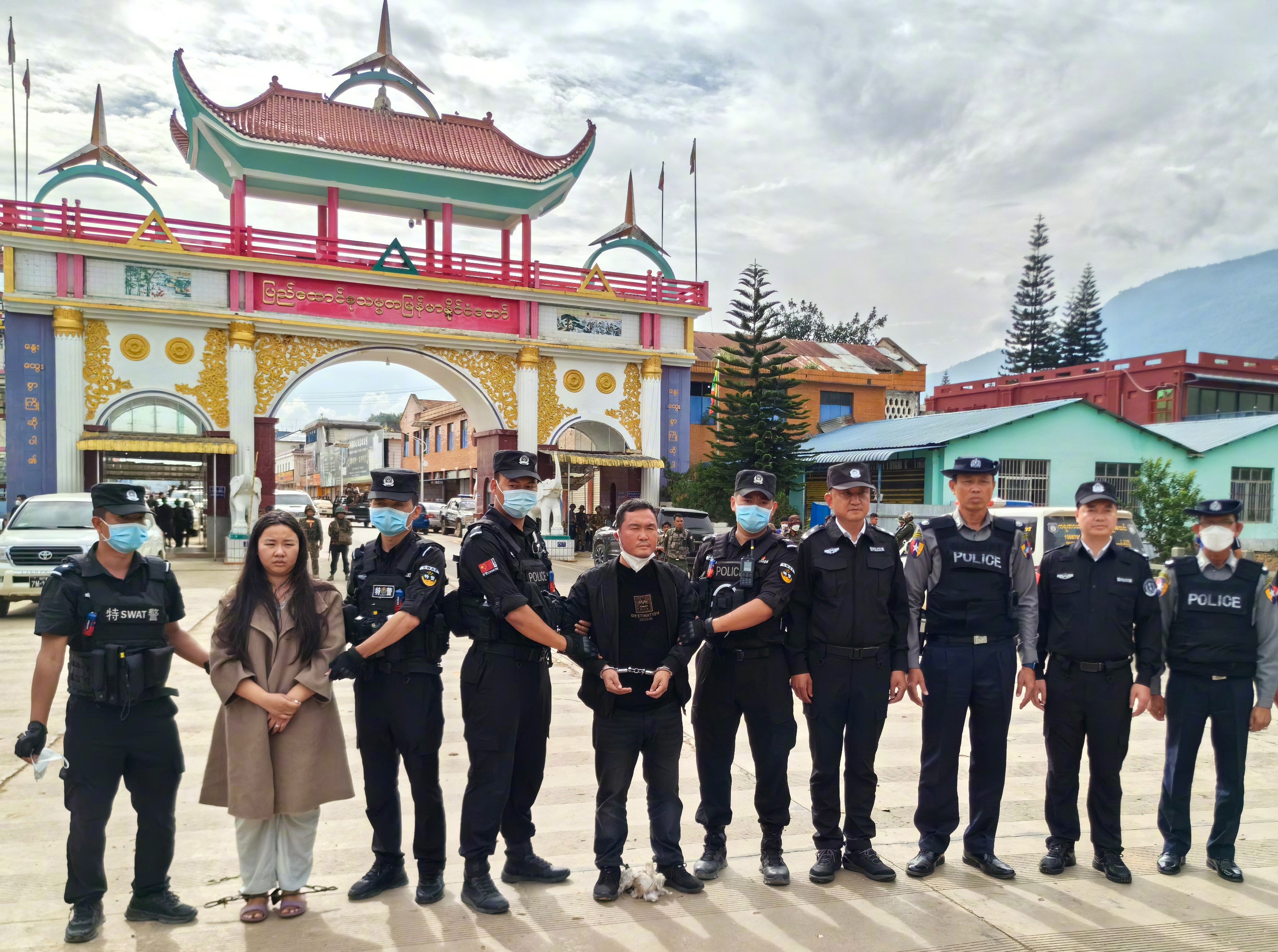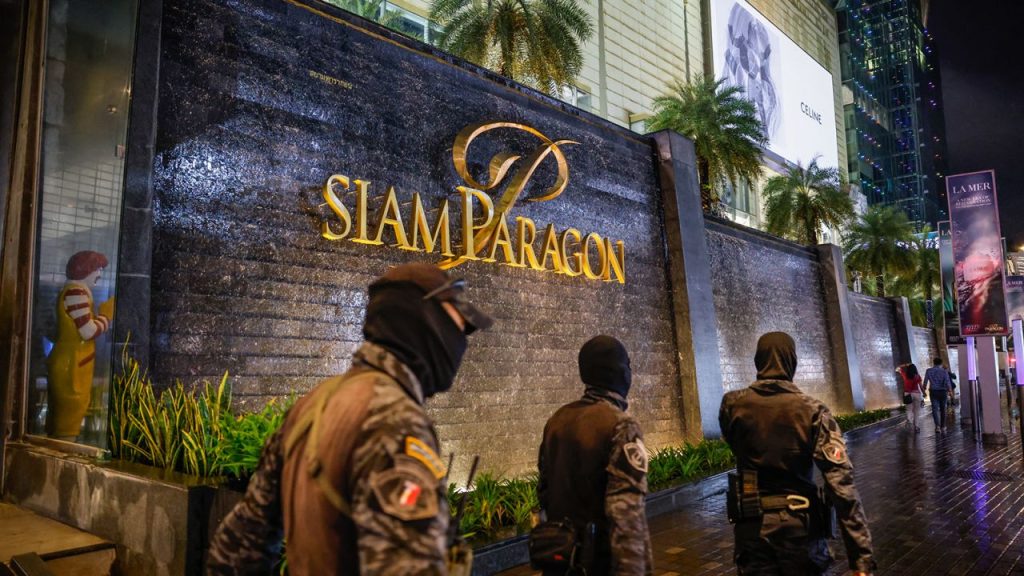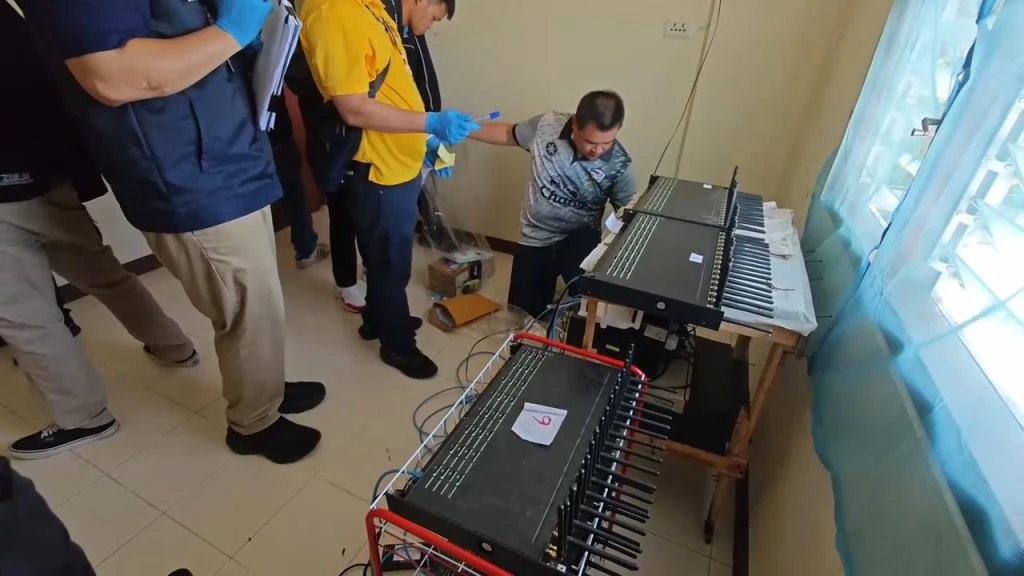Crime
Victims in Thailand Duped Out of US$461Million By Online Scammers

Thailand’s Central Investigation Bureau (CIB) commissioner told Thai Media that online scammers will increase their assault this year as more and more people increasingly rely on online technology for daily activities ranging from purchasing necessities to accessing.
Central Investigation Bureau (CIB) commissioner Pol Lt Gen Jirabhop Bhuridej told a press briefing that according to Royal Thai Police (RTP) cybercrime statistics, over 400,000 incidents were registered between March 1 and November 30 last year.
Deceptive schemes involving fraudulent and subpar goods and services came first, accounting for 40.8% of all cases. However, fraudulent investment schemes caused the most financial harm, with losses totaling more than US$461 Million (16 billion baht).
Data from November 2022 and December 2023 revealed that about 21,000 incidents were recorded in both months, indicating that internet frauds continue to be prevalent. “These figures highlight the threat posed by online scams and the importance of taking preventative measures,” stated the CIB commissioner.
Combating cybercrime is challenging due to scammers’ use of technology to perpetrate crimes and hide their footprints, according to Pol Lt Gen Jirabhop.
Online Scammers Employing AI Technologies
He said that scammers employ new equipment and strategies for their criminal activities, such as SIM boxes and Voice over IP (VoIP), hampering law enforcement authorities’ efforts to combat cybercrime.
In addition, law enforcement organizations confront three additional problems when it comes to countering cybercrime.
First, he said, internet scammers typically operate within Myanmar’s border areas, where the fighting between ethnic rebels and government troops makes it difficult for Thai officials to examine them. He predicted that scammers would also seek refuge in places controlled by armed groups, such as Laukkaing in northern Myanmar.

Second, he claims that behind online scams are complicated criminal networks. They are multinationals, making it harder for police to coordinate their operations and track them down, he said.
Finally, legal and jurisdiction considerations complicate matters, he claims. Due to the nature of online scams, worldwide cooperation is necessary to bring these offenders to justice.
To tackle internet scams, Pol Lt Gen Jirabhop announced the establishment of the Anti-internet Scam Operation Centre (AOC) 1441 hotline. It brings together banking, internet service providers, law enforcement, and telecom authorities in a proactive effort to address the threat to the public.
Improve information-sharing
According to him, the program is aimed to streamline coordination, enable database administration, and improve information-sharing, and the police are also using technology to expedite their job and improve their abilities to combat cybercrime. Technology plays a significant role in managing complaints, acquiring intelligence, analyzing criminal patterns, and connecting with other organizations, whether they are banks, internet service providers, or telecom operators.
To stay one step ahead of criminals, police are attempting to create networks and contacts with other law enforcement organizations to share knowledge, investigation tactics, and information regarding illegal activity.
He believes it is critical for law enforcement to “unlearn, relearn, and reskill” to address the increasing challenges provided by emerging threats such as Bitcoin, the dark web, and deep fakes.
Changing organizational structures is critical to increasing law enforcement organizations’ efficacy in countering cybercrime, according to Pol Lt Gen Jirabhop.

As the CIB commissioner, he has been tasked by the prime minister with serving as the secretary-general of the AOC and establishing a working group to collaborate with other agencies and devise effective ways to combat cybercrime.
“Because crime has become borderless, it is time to elevate partnership and collaboration at the regional and global levels.” Victims in Thailand may be targeted by criminals headquartered in other countries. Therefore, we need a strong ally to keep crime at bay,” he said.
He stated that the public may actively participate in the battle against cybercrime, saying that the CIB has used social media to warn them about online fraud spot scams and encourage them to report suspicious actions. He also stated that CIB mobile applications will be available soon.
Violent Crimes and Mass Shootings
As online scams continue to pose a huge threat this year, he added, violent crimes such as mass shootings are increasing around the world, raising considerable worries for authorities and the public.
Because such incidents are sometimes unanticipated and have a catastrophic impact on communities, the CIB has organized workshops at schools and private companies to assist people in understanding the risks and developing a plan to deal with such events and stay safe, he said.
He also stated that the agency has collaborated with the Police General Hospital to check the mental health of its personnel and provide them with early diagnosis and treatment, which is critical given the stressful nature of their work.
He also stated that the government has cracked down on illegal firearms, resulting in the confiscation of weapons and the arrest of several offenders.

The shooting at the Siam Paragon retail mall in October of last year was one of the bloodiest days in recent years. A 14-year-old child is accused of randomly shooting individuals, killing one Thai and two foreign nationals and injuring five others.
The shooting happened just a few days after the first anniversary of a shooting in Nong Bua Lam Phu, where a former police officer armed with a knife and a gun assaulted a nursery, killing 24 children and 12 adults.
The Siam Paragon incident prompted a strengthening of gun control laws, including a prohibition on the importation of guns and imitation firearms.
Concerning southern unrest and potential violence in the capital, Pol Lt Gen Jirabhop stated that the RTP’s forward command has surveillance systems in place and monitors the activities of questionable individuals.
The CIB has directed forces under its command, such as the Crime Suppression Division, the Marine Police, and the Highway Police, to work closely with local law enforcement.
New comprehensive crime database
According to Pol Lt Gen Jirabhop, who envisions the CIB as a data-driven organization, improving data collection is one of the primary areas the CIB is working on to combat crime better. The CIB can better analyze trends and patterns, plan, and devote resources to address them with extensive and reliable data.
Poor data collecting can lead to incomplete or inaccurate data, making it impossible for police to undertake effective data analytics, he explained, adding that the CIB has collaborated with the Thailand Institute of Justice to create a robust and comprehensive crime database.
According to him, the UNODC’s International Classification of Crime for Statistical Purposes provides a complete framework for creating statistics on criminal justice and will serve as a model.
According to him, the CIB can gain useful insights from crime data and improve its crime prevention, suppression, and investigation work.
“Technology allows criminals to target people from anywhere, and new technologies make it more difficult to find them.” The whole public should arm themselves with knowledge. “It is the most effective and first line of defense against crime,” he stated.

Myanmar Genearls Protecting Online Scammers
The township of Laukkai had been a hub for numerous online scam centers operated by criminal syndicates, employing a significant workforce.
According to the leader of anti-Junta forces striving to gain authority over the area, the online scam syndicates near the Chinese border in northern Shan State generate an annual revenue of US$14 billion. These syndicates are managed by four families who receive protection from the Myanmar military junta generals.
The revelation was made by Peng Deren, the leader of the Myanmar National Democratic Alliance Army (MNDAA), in a New Year’s message to supporters and reported by The Irrawaddy, an independent news service in Myanmar.
Following weeks of heavy combat with junta troops, the anti-junta forces known as the Three Brotherhood Alliance took control of Laukkai, the biggest town in the Kokang region and the core of the scam activities.
According to Peng, four “big families” perpetrated hundreds of online scams in Laukkai before it was raided by the Brotherhood Alliance, with as many as 100,000 people working for them.
Because the frauds were primarily aimed at Chinese consumers, the majority of the personnel at the centers were Chinese or spoke the language.
Under pressure from China, Myanmar police affiliated with the Three Brotherhood alliance have increased arrests and deportations in recent months. According to Chinese media, 41,000 alleged scammers were brought to China last year.
However, when the town was assaulted, the Myanmar military deployed helicopters to evacuate the leaders of the crime syndicates, according to Peng.
The MNDAA is one of the Brotherhood Alliance’s three ethnic armies. On October 27, last year, they started Operation 1027 to force junta troops out of northern Shan State. According to Peng, the junta protects the four families that manage the syndicates, referring to the Bai, Wei, and two Liu clans.

Crime
Police Officer Being Ordained at Temple Arrested for Running Scam Call Center

Police in Northern Thailand have arrested a fellow officer as he was being ordained at a temple in Ngao district of neighbouring Lampang province.
Pol Lt Col Bandit Khonkan chief inspector from the Hang Dong police station was disrobed and taken to the Chang Puak station in Chiang Mai. He was arrested on charges of running a call centre scam gang in Chiang Mai Province.
According to Thai Media Chiang Mai Provincial Police Region 5 obtained an arrest warrant for Pol Lt Col Bandit on Friday from the Chiang Mai Provincial Court for procuring illegal telecom equipment, setting up a station and using public airwaves to run a telecommunications business without permission.
Pol Lt Col Bandit reportedly told investigators that he was not the ringleader and was only a member of the gang with Chinese partners.
His arrest followed the apprehension of his 26-year-old daughter, Miss Wanuchapond, 26, and three others during raids at three housing projects in Chiang Mai on Friday, Pol Maj Gen Weerachon Boontawee, deputy chief of Provincial Police Region 5 told Thai media.
During the raids police police discovered around 12 GSM gateways, or SIM boxes, which are devices used for converting cellular networks into mobile phone numbers used domestically.
The chief inspectors daughter Miss Wanuchapond told the arresting officers that she was paid 8,000 baht a month at each of the three locations for renting thr rooms and monitoring devices.

She claimed she had no idea what the devices were and accepted the job because the pay was attractive.
Police investigators working with telecom regulators used a special tracking device to monitor the gang’s communications and learned that its base was in Myanmar opposite Mae Sai district of Chiang Rai.
The call center gang used the GSM gateways to make calls over the internet to scam people in Thailand out of million of baht.
The GSM gateways transmitting signals via SIM boxes to convert them into domestic phone numbers, duping victims into thinking they were being called from Thai government agencies.
Pol Maj Gen Weerachon said that each SIM box held 32 SIM cards, with a capacity of up to 300,000 calls a month. The seized devices had made fraudulent calls over 3.6 million times.
He said the their investigation is ongoing and they are working to track down the remaining conspirators, including Chinese and other Thai suspects.
Authorities are still deciding whether Pol Lt Col Bandit will be dismissed from the force, he said, adding that so far, no other officers are known to have been involved.

Meanwhile, Prime Minister Settha Thavisin has authorized the establishment of an emergency cyber center operated by the Royal Thai Police to combat transnational crimes committed by call center gangs along the Thai border in Chiang Rai province.
On July 19, Prime Minister Settha Thavisin directed the Center to combat information technology crimes. The Royal Thai Police (Royal Thai Police) will crack down on call center gangs in Myanmar, Laos, and along the border.
His directive comes as call center gangs ratchet up their scams to defraud people of their money, causing concern among Thais and jeopardizing the country’s economic and social stability.
Related Police News:
Machete Wielding Man Shot an Killed by Police in Chiang Rai
https://www.chiangraitimes.com/chiangrai-news/machete-wielding-man-shot-an-killed-by-police-in-chiang-rai/
Crime
Thai Immigration Police Arrest Colombian Tourists Over Home Invasions

Immigration police officers have arrested four Colombian nationals in connection with a series of home burglaries at luxury housing complexes in the Bangkok metropolitan area and Chiang Buri Province.
Pol Maj Gen Panthana Nuchanart, deputy commissioner of the Immigration Bureau, told a press briefing that three of the suspects were apprehended in Nonthaburi Province and the fourth in South Pattaya, Chon Buri Province.
According to the Bangkok Post, the Colombians were charged with stealing conspiracy and seized around 3 million baht (US$82,500.00).
According to Pol Maj Gen Panthana, the criminals rode motorcycles through housing estates, scoping out the properties and waiting for the owners to depart before committing their crimes.
He stated that all four of the accused denied any involvement in the home break-ins, but the arresting squad discovered evidence that implicated them.
Police called to home invasion
Meanwhile, police were dispatched to a luxury housing development in Tambon Nong Prue, Chonburi Province, after a Chinese man was attacked during a house invasion.
When they arrived, they discovered the house owner, Mr. Qian Peng Yi, visibly scared and with marks from being tied up with a cable. He informed police that three Chinese males broke into his home at 9 p.m., one of whom brandished a gun at him and directed him to his bedroom.
They bound his hands and feet, gagged him with fabric, taped his head, and forced him into the bed. The intruders then attempted to compel him into transferring 10 million baht in cryptocurrencies to them, endangering the life of his 33-year-old cousin who was in a second-floor bedroom.
While they scoured the house in search of riches, Mr. Peng Yi managed to flee and hide; he subsequently observed them leave with his cousin. Officials investigated the property and analyzed security camera footage from the incident and surrounding areas.
Around 9 p.m., a 30-year-old van driver came at the Bang Lamung police station after being contacted by an agency to carry Chinese customers from Pattaya to Suvarnabhumi Airport.
The driver informed authorities that he was supposed to pick them up at a motel about a kilometer from the Chinese businessman’s home. He then drove them to Bangkok’s Suvarnabhumi airport, arriving at 1 a.m. and receiving 1,800 baht.
The driver took a snapshot of the group smoking at the airport gate and identified one of them as the victim’s cousin. Police suspected coordination between her and the three suspects in her cousin’s heist, who all departed Thailand on the same aircraft.
Other Bangkok News:
Police in Bangkok Discover Six Vietnamese Tourists Dead in 5 Star Hotel
Police in Bangkok Discover Six Vietnamese Tourists Dead in 5 Star Hotel
Crime
Son of Thailand’s Leading Legal Scholar on Corruption Arrested for Running Online Gambling Network

The son of a former senator and leading economist and expert on corruption and gambling in Thailand has been arrested for on charges of running an online gambling network and its payment system.
Police from Thailand’s Technology Crime Suppression Division (TCSD) have confiscated assets worth more than (US$ 11.1 million) 400 million baht.
Narote Piriyarangsan, 33, was arrested following crackdowns in three sites around the city, according to Pol Maj Gen Athip Pongsiwapai, commander of the police Technology Crime Suppression Division (TCSD).
Mr Narote’s father, Sangsit Piriyarangsan, is an economist who has written articles and books about corruption and gambling. He was one of the appointed senators that were investigating the government’s intention to legalize casino gaming before their terms expired.
Police also detained 39-year-old Narayut Narakaew, the owner of the gambling website 69pgslot.com. The Criminal Court issued arrest warrants for the couple for operating an internet gambling service and money laundering.
According to the Bangkok Post, police seized two desktop computers, one laptop computer, 14 mobile phones, 21 bank passbooks, 53 ATM cards, and four high-end cars — a Ferrari 926 GTS, an Aston Martin, a Lexus, and a Subaru — totaling more than 400 million baht.
Police launched the inquiry after discovering the online gambling site, which accepted funds via an automatic deposit-withdrawal system through bank accounts and deposits in the AskMePay system. Players scanned the VPay QR code as well as the QR codes for Heng Online 888 or Heng Pay Company.
Police also discovered that payments received via QR code scans were transferred to the account of Heng Pay Co and then to the gambling website’s mule accounts using AskMePay, which did not use banks’ face recognition scanning. An inquiry indicated a monthly turnover of approximately 5 billion baht.
According to investigators, the website has been up and running for around four years, with the payment mechanism in use for roughly eight months.
According to Pol Maj Gen Athip, Mr Narote owns the gaming website’s payment systems and is the director of Heng Pay Co. After gathering evidence, authorities requested arrest warrants for 14 people.
Thailand does not allow almost any kind of gaming. Even though the law doesn’t say anything specific about online gaming, it is still considered gambling. The country has pretty strict rules about gambling. Thai punters can bet on the national lottery and horse races, but they can’t bet on any other types of games.
But it’s not a secret that there is a huge illegal gaming business in Thailand, even though it’s illegal.
The illegal casinos, online betting shops, underground lotteries, and pop-up bookies that take bets on everything from cockfights to Muay Thai make a shadow economy that is worth billions of dollars every year.
Related News:
Thailand’s Cyber Crime Police Raid Top Cops Home Over Gambling Websites
Thailand’s Cyber Crime Police Raid Top Cops Home Over Gambling Websites
-

 News4 years ago
News4 years agoLet’s Know About Ultra High Net Worth Individual
-
Entertainment2 years ago
Mabelle Prior: The Voice of Hope, Resilience, and Diversity Inspiring Generations
-

 Health4 years ago
Health4 years agoHow Much Ivermectin Should You Take?
-

 Tech2 years ago
Tech2 years agoTop Forex Brokers of 2023: Reviews and Analysis for Successful Trading
-

 Lifestyles3 years ago
Lifestyles3 years agoAries Soulmate Signs
-

 Movies2 years ago
Movies2 years agoWhat Should I Do If Disney Plus Keeps Logging Me Out of TV?
-

 Health3 years ago
Health3 years agoCan I Buy Ivermectin Without A Prescription in the USA?
-

 Learning3 years ago
Learning3 years agoVirtual Numbers: What Are They For?